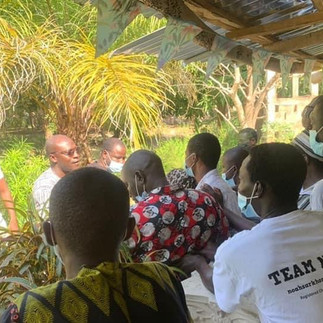A two day capacity building workshop for Environmental Advocacy Groups ended in Gunjur today
- Gunjuronline.com

- Nov 7, 2021
- 3 min read
Greenpeace Africa has completed a two days Capacity Building with Gambia Environmental Advocacy Groups on Sunday, 7th November 2021.
Environmental Advocacy || Climate Action || Non-violence Rallies & Demonstrations

Environmentalists in the country have recently completed a training on advocacy tips and use of non-violence approaches to address environmental and climate change issues in The Gambia. The event was supported and facilitated by Greenpeace Africa and coordinated by Famara Drammeh, Ahmed Manjang, Mustapha Manneh and Omar AJ Saho.
The coordinators of the training shared their views on the two day training workshop on "Advocacy Tips and Non-violence Approach" of addressing climate change and environmental degradation in The Gambia following the successful completion of the event.
The event aimed to equip participants with skills and experience that they can utilise in their various specialized areas of environmental and climate advocacy. The event was held at Gunjur Dalaba Ecolodge, the home of eco-friendly events in the Gambia.
The participants where able to learn and share experiences of various strategies, processes, and best practices that seems to work when dealing with government agencies, regional/local governing institutions, and community groups, on addressing climate change and environmental issues.
The workshop further trained participants on various techniques that could be utilised while working to protect and preserve Gambia's environment and natural resources, and how to engage key stakeholders on climate issues.
The workshop brought together seventeen (17) participants drawn from environmental organisations that are activist-type across the country. The organisers of the training realised that enhancing the understanding of these organisations about institutional and legislative frameworks governing environmental protection is key. Thus equipping the selected participants with advocacy tips and non-violent best practices will greatly help them in their future works.
Omar AJ Saho, one of the event organisers added that someone may wonder why non-violence? He added that non-violent actions seems to be way that works in winning the hearts and minds of some organisations, policymakers, and citizens about climate change, and environment and ecological related challenges affecting the lives, health, future, and livelihoods of locals.
Mr. Saho further stated that in addressing Gambia's predicaments of climate change and environmental concerns, they want environmental activists in the Gambia to assess on the things that are safe and that are legal? What are the things that may break a rule … but will still put the point across? Among others!!!
Mr. Saho and also advised that policymakers in The Gambia strengthened environmental protection policy and work towards the actual implementation and enforcement of those policies and its related regulations and programs. The government is urged to hold polluters accountable for their actions.
Greenpeace Africa team in their closing remark emphasised the need for delivering environmental justice for communities all across Africa. They stressed that environmental and climate jusitce can't be achieved in the absence of knowledge and experience sharing with grassroots organisations across the continent. Thus, marshaling the creativity, courage, and human resources necessary to make Gambia and the rest of Gambia resilient in the face of climate threat is important. In this regard, environmental organisations must take progressive actions through the use of non-violent best practices to ensure that their voices are heard to achieve substantial outcome on urgent environmental and climate issues.
Ahmed Manjang, Mustapha Manneh and Famara Drammeh all added that
deploying experience earned from the event will greatly go a long way to combat the climate crisis and will aid in uses of non-violence rallies, marches, and demonstrations. As environmentalists, all our efforts should be centered around government and stakeholders engagement in increasing local communities resilience to the impacts of climate change; protection and conservation, local biodiversity and natural resources; delivery of environmental justice; and promotion of sustainable eco-friendly economic growth in The Gambia.










Comments